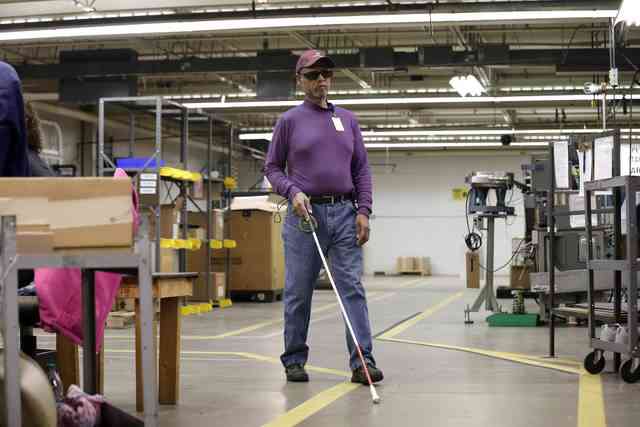
WORK-BASED learning has been defined as a combination of two strategies, that increase employment opportunities for students with disabilities through work experience and vocational training.
Work-based learning for students with disabilities entails supervised, school coordinated activities that provide them with opportunities to achieve employment-related competencies in a workplace environment.
The experience extends from the classroom to the workplace, supporting students in their career interests and studies, while gaining meaningful work experience.
Through work-based learning, students with disabilities are assessed on their interests, skills and abilities while being exposed to the work environment and such experiences increase their chances of employment and community integration.
Examples of work-based learning include, apprenticeship, paid or unpaid internship, work study programmes, volunteering, job shadowing among others. People with intellectual disabilities learn better with hands-on practical experience.
The classroom training to workplace training accommodates people with learning disabilities where generic skills development is not easily transferred from the classroom to the workplace.
Evidence shows that work-based learning builds other non-vocational and soft skills, such as communication, decision-making and time-management.
Students with disabilities in higher learning institutions experience challenges in work-based learning settings associated with exclusion from workplace activities and negative attitudes or misconceptions around disability.
- Bulawayo City fire coach Ncube
- Bulawayo City, Beefy part ways
- Zim coach in Rwanda success
- Miss Albinism vaccination drive gathers steam
Keep Reading
Such discriminatory experiences have negatively impacted the sense of belonging and integration within the workplace culture. Exclusion often starts from the lower levels of education, when children with disabilities are denied access to quality education, which affects their ability to learn literacy and numeracy skills in basic education.
Considering the low education and literacy rate, access to Technical and Vocational Education and Training (TVET) Institutions is significantly limited. In cases where individuals with disabilities access learning institutions, it is supply-driven and at times they are forced to enrol for programmes that they are not interested in.
Some students may be hesitant to disclose their disabilities to employers or co-workers due to fear of stigma and discrimination.
Workplaces might not be fully accessible creating mobility challenges, while students with language or speech impairments may struggle to effectively communicate with their co-workers in the workplace.
Some students with disabilities may encounter transportation barriers when commuting to and from their work-based learning placements, other students may have trouble in obtaining the necessary accommodation or adaptions to support their learning experiences.
However, work-based learning provides them with additional benefits, which include, opportunities to determine if they can perform essential functions of a particular job with or without reasonable accommodation, in addition to disclosing their disability and requesting for reasonable accommodation from potential employers.
The experience enables students with disabilities to develop confidence and self-advocacy skills required in education and career development.
In line with the Convention on the Rights of Persons with Disabilities (Article 27) and the National Disability Policy, people with disabilities should have access to technical, vocational, and other forms of training on an equal basis as others and be provided with reasonable accommodation in the workplace.
In addition, they should be accepted in a work environment that is inclusive and accessible. Persons with disabilities must be employed-based on skills, merits, qualifications, knowledge, and abilities, and not just on the basis of disability.
Work-based learning provides opportunities for individuals with disabilities to develop their vocational skills, while being exposed to the world of work settings, increasing their chances for employment and independence.
Work-based learning allows people with disabilities to explore potential career opportunities in various industries, supporting them to make informed choices for their future employment.
Through completing work-based learning experiences, their self-confidence and self-esteem is enhanced as they pursue their career goals.
Participating in work-based learning with their peers, who have no disabilities, fosters social integration. Disability should be every organisation’s diversity and engaging individuals with disabilities, increases employer awareness and acceptance by getting first-hand experience working with individuals from diverse backgrounds.
Some employers have misconceptions about low and poor performance levels of people with disabilities, which has restricted employment opportunities for people with disabilities.
Work-based learning helps to break down the stereotypes and misconceptions surrounding disability and to showcase the capabilities and contributions that people with disabilities can make in the workplace.
Recommendations
Addressing challenges associated with work-based learning for students with disabilities requires collaborative efforts from educational institutions, employers, and policy-makers to ensure that learning programmes are inclusive and accessible.
This includes providing appropriate accommodations, promoting an inclusive culture, acceptance, and education to understand disability related issues in the workplace.
TVET institutions should build partnerships with employers and employment services to facilitate on the job support for students with disabilities.
Employer and employee organisations have a role to play in addressing the needs of people with disabilities transitioning into the workplace, through understanding their needs and taking a diverse approach and innovative strategies to extend their support and services to address exclusion in the workplace.
Inclusive policies and approaches should be adopted to promote the transition of individuals with disabilities from learning institutions into the workplace, enabling access to resources and opportunities.
Learning institutions and employers should identify and address discriminatory practices that hinder access to learning institutions and the workplace by individuals with disabilities.
Addressing socially-induced barriers that have led to discrimination limiting access to training, education and reasonable accommodation will enable a person with a disability to transition into the world of work.
Disability is diverse and the capabilities of people with disabilities are diverse. However, the provision of reasonable accommodation will enable the person with a disability to participate and ensure productivity.
Training should be made accessible, which entails including practical approaches in addition to developing literacy skills and other work skills.
Assigning mentors or coaches to support work-based learning will enhance skills development. Organisations and learning institutions need to review their policies as they may reflect discriminatory practices, which need to be changed to reflect a rights-based approach that is inclusive.
Promoting awareness and education on disability inclusion is imperative to address negative attitudes and misconceptions that hinder access to training and employment opportunities for people with disabilities.
Work-based learning for students with disabilities not only benefits the individuals themselves but also society by fostering diversity, inclusion, and the achievement of sustainable development goals.
- Tigere is a development practitioner. These weekly New Horizon articles, published in the Zimbabwe Independent, are coordinated by Lovemore Kadenge, an independent consultant, managing consultant of Zawale Consultants (Pvt) Ltd, past president of the Zimbabwe Economics Society and past president of the Chartered Governance & Accountancy Institute in Zimbabwe (CGI Zimbabwe). — kadenge.zes@gmail.com or mobile: +263 772 382 852.







